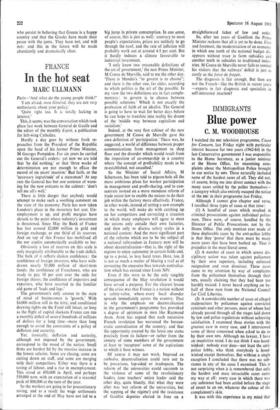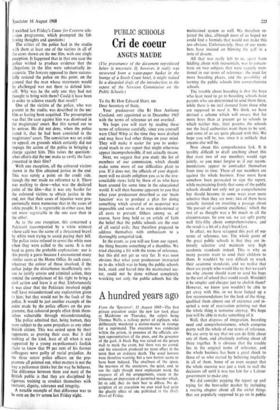Blue power
IMMIGRANTS
C. M. WOODHOUSE I watched the BBC television programme, Cause for Concern, last Friday night with particular
interest because for two years (1962-64) in the
last Conservative government I was responsible to the Home Secretary, as a junior minister
at the Home Office, for examining com- plaints about the Metropolitan Police brought to our notice by MPs. These naturally included
some of the hardest cases of all. They did not, of course, bring me into direct contact with the many cases settled by the police themselves— a category which also entirely escaped the notice of the BBC in their programme last Friday.
Although I cannot give chapter and verse, I recollect three types of cases at that time: (1) A handful of cases which resulted in criminal prosecutions against individual police- men. These were, of course, handled by the Director of Public Prosecutions, not by the Home Office. The only mention ever made of these deplorable cases by the anti-police lobby is that they 'prove' that there must be many more cases that have been hushed up. That is prejudice in the most literal sense.
(2) A number of cases in which severe dis- ciplinary action was taken against policemen by their own superiors, including enforced resignation and even dismissal. These cases came to my attention by way of complaints
from the policemen themselves through their MPS, usually claiming that they had been too harshly treated. I never heard anything on be- half of these men from the National Council for Civil Liberties.
(3) A considerable number of cases of alleged malpractices by policemen against convicted criminals and other persons, most of whom had already passed through all the stages laid down by law and police regulations without achieving satisfaction. I examined these stories with the greatest care in every case, and I interviewed some of those concerned when asked to do so by their own stn. Although no lawyer, I have an inquisitive mind. I do not think I was hood- winked: nobody ever does—not least the anti- police lobby, who think everybody is hood- winked except themselves. But without a single exception I concluded that there was no sub- stance in any of the cases I examined. This is not surprising when it is remembered that only the hardest and most intractable cases came my way at all: every case in which there was any substance had been settled before the stage of resort to an NIP, whatever the colour of the complainant's skin.
It was with this experience in my mind that I watched last Friday's Cause for Concern tele- ision programme, which prompted the fol- lowing thoughts and questions: The critics of the police had in the studio ssith them at least one of the victims in all of the cases shown on the BBC film, with one single exception. It happened that in that one case the police wished to produce evidence that the allegations in the film were substantially in- iccurate. The lawyers opposed to them success- fully resisted the police on this point, on the around that the man whose statements would be challenged was not there to defend him- self. Why was he the only one they had not thought to bring with them? Could it have been in order to achieve exactly that result?
One of the victims of the police, who was present in the studio, was described in the BBC film as having been acquitted. The presumption was that the case against him was dismissed in the magistrates' court. But this turned out to be untrue. He did not deny, when the police stated it, that he had been convicted in the magistrates' court. The conviction was set aside on appeal, on grounds which certainly did not impugn the action of the police in bringing a charge against him. This raises the question: what efforts did the BBC make to verify the facts presented in their film?
With one exception, all the coloured victims shown in the film obtained justice in the end. This was surely a point on the credit side, though the BBC made no reference to it. There was nothing to show—what was the declared point of the film—that it was any harder for the coloured victims to obtain justice in the end, nor that their cases of injustice were pro- portionally more numerous that in the cases of white people. It is regrettable in either case, but not more regrettable in the one case than in the other.
As to the one exception, this concerned a Pakistani (accompanied by a white witness) whose cafe was the scene of a threatened brawl by white men trying to avoid paying their bill. The police twice refused to arrest the white men when they were called to the scene. It is not hard to guess the probable explanation: nor is this purely a guess because I encountered many similar cases at the Home Office. In such cases, whatever the colour of those involved, if the police judge the disturbance insufficiently seri- ous to justify arrests and criminal action, they remind the complainant of his right to bring a civil action and leave it at that. Unfortunately it was clear that the Pakistani involved might well have misunderstood any explanation given to him; but that would not be the fault of the police. It would be just another example of the point made by the police officers on the pro- gramme, that coloured people often think them- selves vulnerable through misunderstanding.
The police admitted that, being human, they were subject to the same prejudices as any other British citizen. This was seized upon by their opponents as proving their case. But it did nothing of the kind, least of all when it was supported by a young ex-policeman's foolish claim to know that 99 per cent of his former colleagues were guilty of racial prejudice. As the three senior police officers on the pro- gramme all pointed out, what matters is not the way a policeman thinks but the way he behaves. The difference between them and most of the British public is that they are disciplined by rigorous training to conduct themselves with restraint, dignity, tolerance and integrity. A notable example of that difference was to be seen on the iv screen last Friday night.



































 Previous page
Previous page